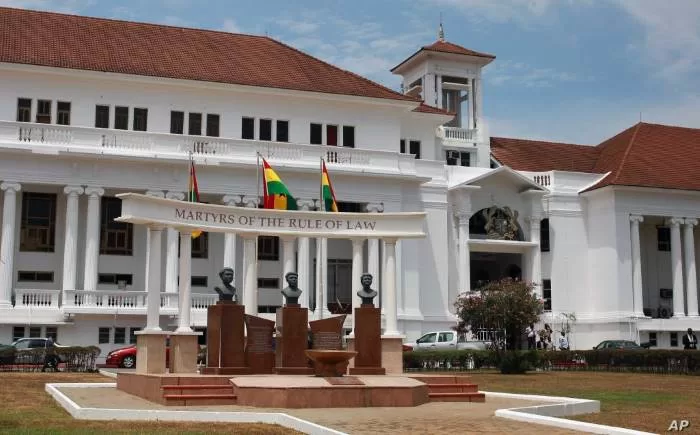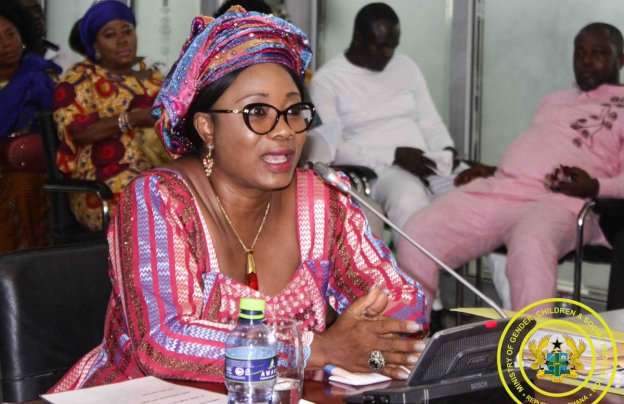The Supreme Court has in a unanimous decision declared that it is unconstitutional for chiefs to endorse candidates or their party.
The court, however, pointed out that chiefs praising or lauding the policy of a candidate is a permissible endorsement.
Justice Emmanuel Yonny Kulendi who authored the November 2022 Judgment of the court, explains that this conclusion is “consistent with the role of a Chief as a champion and an advocate for the welfare and interests of their communities”.
He nonetheless, stated that other statements where a Chief is heard to endorse the person of the candidate or his party by declaring their preferential support for the election of the candidate or his party or urging voters to vote for them are the kind of “taking sides” in a partisan political contest which the constitution disapproves of.
This is the Apex Court’s decision in a case filed by legal practitioner Elorm Kwame Gorni against the Attorney General.
It was heard by Justices Jones Dotse, Gabriel Pwamang, Nene Amegatcher, Prof Ashie Kotey, Mariama Owusu, Lovelace Johnson and Emmanuel Yonny Kulendi.
Mr Gorni had urged the apex court to interpret “active party politics” as used in Article 276(1) of Ghana’s constitution, which provision states;
“A chief shall not take part in active party politics, and any chief wishing to do so and seeking election to Parliament shall abdicate his stool or skin.“
He wanted the court to declare that certain chiefs who during the electioneering campaign leading up to the 2020 General Elections “endorsed” either the NPP’s Nana Akufo-Addo or the NDC’s John Dramani Mahama were engaged in active party politics. He argued that such an endorsement was a breach of the Constitution.
The Attorney General took the view that the case raises no issue requiring the interpretation of the court.
He pointed out that the word “active” is “clear, unambiguous and admits of no interpretation”.
The AG further pointed out that a chief’s endorsement of a candidate for “elective political office without more cannot be said to constitute an engagement in active party politics”.
He insisted chiefs like every citizen have the right to freedom of speech and expression as well as the freedom of thought, conscience and belief.
The Supreme Court however took the view that the phrase “active party politics” raises and presents an issue worth interpreting.
Justice Kulendi explained that it was important for “the exact contours or boundaries of what constitutes such participation” to be determined.
On the substantive issue of chiefs and politics, Justice Kulendi said chiefs occupy an elevated position in the social order and play an influential role in the governance and development of their communities and the country.
“It is on account of the exceptional social and public status of chiefs that although chiefs are not public officers, the constitution disqualifies certain persons, notably persons convicted of offences involving fraud, dishonesty or moral turpitude from being chiefs.
“It is the same heightened concern with preserving and protecting the dignity of the chief’s office that partly underpins Article 276(1)’s banning of chiefs from taking part in active party politics.”
He continued that chiefs are not barred from expressing their opinions about matters that are the subject of public debate and discussion.
This he added strikes the right balance between the rights of Chiefs, the reasonable expectations associated with their role and the public interest concerns that animated the said constitutional provision.
Mr Gormi attached various statements made by some chiefs to his court documents.
“The Paramount Chief of the Duayaw Nkanta Traditional Council, Nana Boakye Tromo III, told the President,
“You have distributed the national cake equitably, and we, in Duayaw Kwanta, have gotten our fair share of development.
The publication proceeded to state that:
“Citing several examples of projects undertaken in Duayaw Nkwanta, together with policies such as Free SHS, 1-District -1-Factory, and the programme for Planting for Food and Jobs, Nana Boakye Tromo III stated that “this clearly shows that you have been sent by God to lead us…”
“We are solidly behind you, and we are declaring today that four more for Nana’, ‘Four more to do more”
The Krontihene of Techimantia, Nana Ampong Koromantan is reported to have said;
“Today, we just want to tell you that we, in Techimantia, will never forget you for the construction of the Bechem-Techimantia-Akomadan road. Indeed the presence of a lot of townsfolk at this durbar testifies to the fact that we have already accepted you as one of us. It is four more for you.”
On his part, the Omanhene of Kenyasi No.1 Nana Kofi Abiri reportedly stated as follows:
“We pleaded with him to construct our roads for us, we also needed a TVER institute. He didn’t ignore our request as we can see machines constructing the road. We also said that we needed a mobile phone network at Wamahiniso, you have done it for us we are grateful.”
The Okyenhene, Osagyefo Amoatia Ofori Panin II is reported to have stated as follows:
“Just like the singer, Lucky Mensah, said in his songs, Nana Akufo-Addo has exceeded all expectations as President and must be given the nod to continue for a second term”.
The Omanhene of Mehame Traditional Area, Nana Owusu Kontoh II is said to have stated the following:
“I have a good road, electricity, ICT centre, health centre and nursing training college among other infrastructure developments and they are all because of Mr. Mahama and Alhaji Collins Dauda who is our MP.
The final comment produced in court was that of the Paramount Chief of the Waala Traditional Area, Naa Fuseini Seidu Pelpuo IV:
“No one, at least not one that has lived in this country can deny the fact that the evidence of your achievements during your tenure abound before us. I am therefore justified to bless your decision to contest the Flagbearer position of your party and by extension to seek a re-run for power in 2020”.
Justice Kulendi noted that the courts could not vouch for the accuracy of the statements. The court nonetheless said it will deal with them and conclude with the presumption that they are accurate. He concluded that the statements above that praise a policy or program or project of a candidate or party are permissible endorsements and not unconstitutional.
On the other hand, those other statements where a chief is heard to endorse the person of the candidate or his party or urging voters to vote for them are the kind of “taking sides” in a partisan political contest that the constitution disapproves of.
















